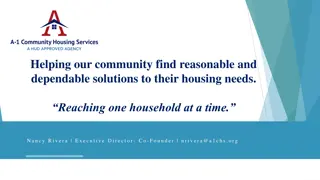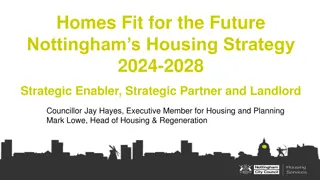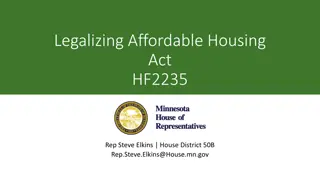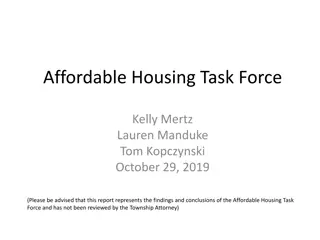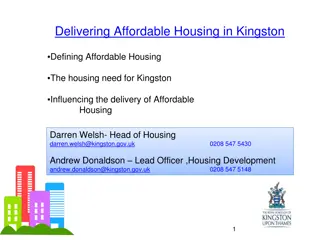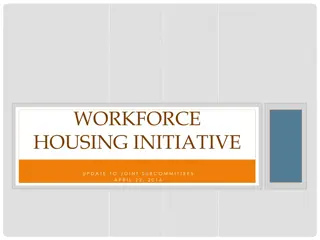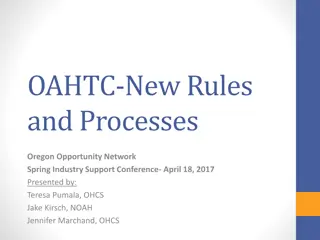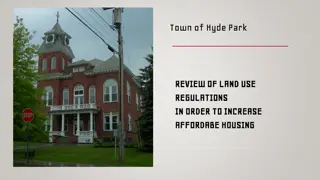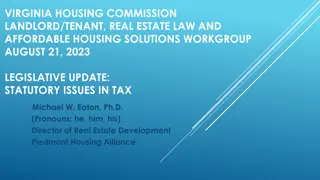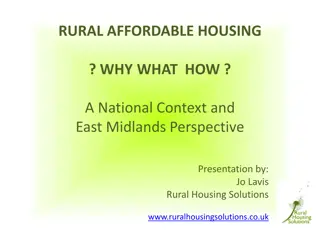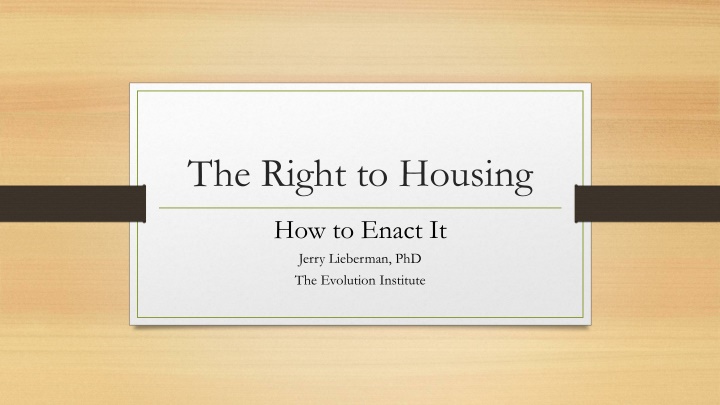
Enabling the Right to Housing: A Human Rights Perspective
Explore the fundamental human right to housing, emphasizing its importance as a necessity for survival and quality of life. Learn how housing impacts health, and why it should be viewed as a fundamental right rather than a commodity. Delve into historical developments such as the UN Universal Declaration of Human Rights Article 21 and the Housing Act of 1949 in the United States, highlighting the government's role in ensuring adequate housing for all individuals. Discover the significance of policies that cater to basic human needs in building a humane and civilized society.
Download Presentation

Please find below an Image/Link to download the presentation.
The content on the website is provided AS IS for your information and personal use only. It may not be sold, licensed, or shared on other websites without obtaining consent from the author. If you encounter any issues during the download, it is possible that the publisher has removed the file from their server.
You are allowed to download the files provided on this website for personal or commercial use, subject to the condition that they are used lawfully. All files are the property of their respective owners.
The content on the website is provided AS IS for your information and personal use only. It may not be sold, licensed, or shared on other websites without obtaining consent from the author.
E N D
Presentation Transcript
The Right to Housing How to Enact It Jerry Lieberman, PhD The Evolution Institute
Housing is a core & basic human need Needs should be mandated rights, and not treated as if they re commodities. Shelter is a necessity for human survival and Quality of Life; well- constructed housing is a contemporary means to provide it. Housing directly affects health and the conditions essential for needs to be realized and sustained.
When needs are treated as commodities, Inequality is prevalent and expansive, Fairness is in decline, Trust is eroded.
The value of housing Should be seen as its use value as a home. Should not be viewed as a real estate asset.
UN Universal Declaration of Human Rights Article 21, adopted in 1948 (1) Everyone has the right to a standard of living adequate for the health and well-being of himself and of his family, including food, clothing, housing and medical care and necessary social services, and the right to security in the event of unemployment, sickness, disability, widowhood, old age or other lack of livelihood in circumstances beyond his control.
Housing Act of 1949, United States The Congress declares that the general welfare and security of the Nation and the health and living standards of its people require housing production and related community development sufficient to remedy the serious housing shortage, the elimination of substandard and other inadequate housing through the clearance of slums and blighted areas, and the realization as soon as feasible of the goal of a decent home and a suitable living environment for every American family, thus contributing to the development and redevelopment of communities and to the advancement of the growth, wealth, and security of the Nation.
In a humane, democratic, and civilized society, The central role of government is to approve and implement policies that serve the basic needs of humans to the extent feasible, financially and scientifically: Britain and Germany started to experiment with government subsidies for housing around the time of the First World War, ultimately developing programs that provided housing for many people, not just the poorest. Social-housing units thrived in places like Sweden and Vienna as early as the 1960s. Sweden saw municipal governments build 1 million social-housing units in the course of a decade. They not only served the poor, but also the working and middle classes. Vienna has three in five residents living in houses built, owned, or managed by the municipality.
In contrast to humane & civilized principles, Prevailing ideas in the US since 1949 about poverty, and of private property, equate the former with a moral failure and the latter with sacredness and personal meritorious accomplish. Housing shortages are merely considered a byproduct of industrial capitalism.
In humane, democratic, and civilized societies, Only the government can reverse the trend that is occurring in most parts of the world, even in places like Norway, which clearly can afford to solve the housing crisis through changes in policies. We have the planning and technical knowledge to provide affordable and inclusionary housing to open the doors for a higher quality of life for all. A movement to advance social/public housing will need to include unions, environmentalists, racial-justice advocates, feminists, faith-based organizations, socially conscious employers and politicians.
The movement will Require a bottom-up approach, including community organizing, technical assistance and deep knowledge and expertise in best practices. Insist upon developing homes for a broad range of citizens resisting the sorts of political attacks that have plagued public housing for decades and creating an enormous number of jobs. Research places where social housing has flourished on the national, regional, and/or local levels & make this knowledge widely available.
Goal: Diminish the role of mortgages by using direct public capital grants to finance the production & acquisition of social housing. Cooperative housing offers advantages because it pools resources to lower individual housing costs, fosters collective action, and self-help. Social ownership includes not-owned and operated for profit, security of tenure, and not to be sold for speculative purposes and implies a more democratic and accountable approach to management and greater resident and community accountability through enhanced transparency. The People s Policy Project recommends that we move toward housing with no means testing that is well served by public transport, with easy access to amenities and shops with discrimination prohibited.
The AFL-CIOs Housing Trust Fund Is one example of the powerful role trade unions can play in the generation of quality affordable housing as well as living wages in the construction industry. Economically Targeted investments bolster AFL-CIO s pension system while adding social benefits for the men and women who build communities. Since inception, by investing with groups like AFL-CIO HIT, the pensions have been able, not only to achieve competitive risk-adjusted returns, but also to finance more than 100,000 units of affordable housing and thousands of good jobs for New Yorkers in need, said New York City Comptroller Scott Stringer on the impact of the HIT s investments.
Housing is most equitable, successful, and sustainable when socially & publicly owned. Market-based governance exacerbates poverty and social disparities, most significantly by under-investments in human capital. It creates ghettos, discriminates against minorities, elderly, disabled, students, and others, while creating homelessness, too. Labor unions can play a vital and comprehensive role in housing affordability: They can inspire attractive design & construction and energy conservation in spaces that are functional, attractive, and environmentally efficient and healthy for habitation.
In Conclusion Norway is financially and technologically capable of setting an example for the world in providing social, affordable, and inclusive housing. Cross fertilization between Nordic and US unions is needed to change the status quo and provide the pathway for transformation.

